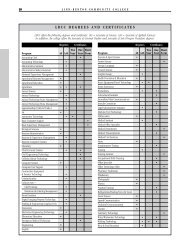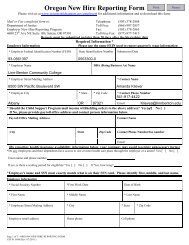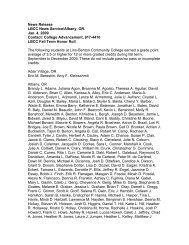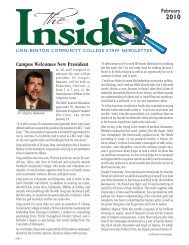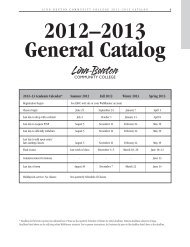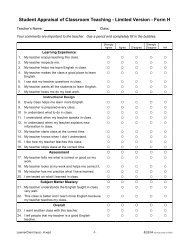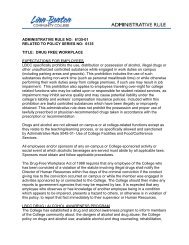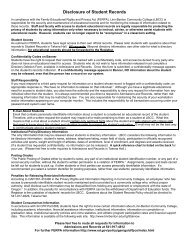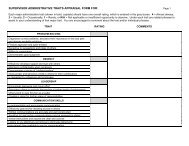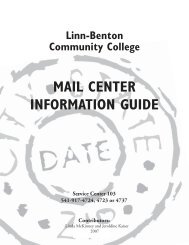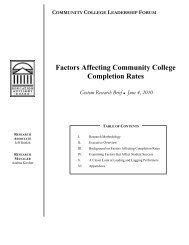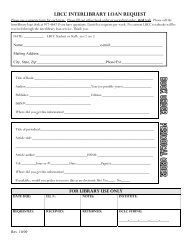2013-2014 LBCC Catalog (complete PDF file) - LBCC Paperless ...
2013-2014 LBCC Catalog (complete PDF file) - LBCC Paperless ...
2013-2014 LBCC Catalog (complete PDF file) - LBCC Paperless ...
Create successful ePaper yourself
Turn your PDF publications into a flip-book with our unique Google optimized e-Paper software.
A S S O C I A T E O F S C I E N C E D E G R E E S 25<br />
Associate of Science Degree<br />
Requirements<br />
The Associate of Science degree is a transfer degree intended especially<br />
to facilitate a transfer to Oregon State University and is an agreement<br />
between Oregon State and Linn-Benton Community College to provide<br />
transfer of <strong>LBCC</strong> coursework to OSU. Students who <strong>complete</strong> this degree<br />
and are accepted to OSU will be admitted as having <strong>complete</strong>d all<br />
lower-division general education (Baccalaureate Core) requirements<br />
but not necessarily school, department, or major requirements with<br />
regard to courses or GPA. Students are encouraged to consult with an<br />
advisor at OSU. For a list of accepted courses at OSU, refer to the <strong>LBCC</strong><br />
web site. Go to http://www.linnbenton.edu/degreepartnership, then click<br />
on the “helpful links” button and look for the “Articulation Tables”<br />
links. (The Articulation Tables identify course equivalencies.)<br />
Students pursuing the Associate of Science degree must meet<br />
additional program emphasis requirements. If your area of interest is<br />
not listed as an AS degree in this catalog, check with an <strong>LBCC</strong> advisor or<br />
counselor to determine the one that is most appropriate for your career<br />
goal.<br />
For students not transferring to OSU, AS degree credits transfer to all<br />
four-year institutions on a course-by-course basis. The assignment of<br />
<strong>LBCC</strong> credit to particular requirements of other schools is made by the<br />
institution to which the transfer is being made.<br />
GENERAL EDUCATION OUTCOMES<br />
Listed below are the general education requirements for the AS<br />
degree. Specific courses that meet these requirements are listed in this<br />
catalog and are available from program advisors.<br />
WRITING/COMPOSITION<br />
As a result of completing the General Education Writing sequence, a<br />
student should be able to:<br />
• Read actively, think critically, and write purposefully and capably<br />
for academic and, in some cases, professional audiences.<br />
• Locate, evaluate, and ethically utilize information to communicate<br />
effectively.<br />
• Demonstrate appropriate reasoning in response to complex issues.<br />
COMMUNICATION<br />
As a result of successfully completing the Communication General<br />
Education requirements, a student should be able to:<br />
• Engage in ethical communication processes that allow people to<br />
accomplish goals.<br />
• Respond to the needs of diverse audiences and contexts; and build<br />
and manage personal and community relationships.<br />
MATHEMATICS<br />
As a result of taking General Education Mathematics courses, a<br />
student should be able to:<br />
• Use appropriate mathematics to solve problems in related<br />
disciplines or real life applications.<br />
• Effectively communicate mathematics using language appropriate<br />
to the audience.<br />
HEALTH & PHYSICAL EDUCATION<br />
As a result of completing the General Education Health, Wellness and<br />
Fitness course, a student should be able to:<br />
• Recognize key determinants of health and wellness.<br />
• Be able to design a comprehensive wellness program for physical<br />
fitness, nutrition, and/or stress management using a selected<br />
process of behavior change.<br />
• Demonstrate the ability to evaluate or assess key indicators of health<br />
such as blood pressure, body composition, blood lipids, blood<br />
glucose, cardiorespiratory fitness, muscular strength and muscular<br />
endurance, and flexibility.<br />
BIOLOGICAL & PHYSICAL SCIENCES<br />
As a result of taking Biological and Physical Sciences Perspective<br />
courses, a student should be able to:<br />
• Gather, comprehend, and communicate scientific and technical<br />
information in order to explore ideas, models, and solutions and<br />
generate further questions.<br />
• Apply scientific and technical modes of inquiry, individually,<br />
and collaboratively, to critically evaluate existing or alternative<br />
explanations, solve problems, and make evidence-based decisions in<br />
an ethical manner.<br />
• Assess the strengths and weaknesses of scientific studies and<br />
critically examine the influence of scientific and technical<br />
knowledge on human society and the environment.<br />
CULTURAL DIVERSITY<br />
As a result of taking a designated Cultural Diversity Perspective courses,<br />
a student will be able to:<br />
• Understand and respect cultural differences by articulating an<br />
understanding of the historical basis of cultural ideas, behaviors,<br />
and issues of inequality; or relating how their cultural background<br />
influences their reactions to or interactions with others.<br />
DIFFERENCE, POWER & DISCRIMINATION<br />
As a result of taking Difference, Power & Discrimination Perspective<br />
courses, a student should be able to:<br />
• Analyze historical and contemporary inequities in society.<br />
• Discuss strategies that would facilitate more equitable societies.<br />
LITERATURE & THE ARTS<br />
As a result of taking Literature and the Arts Perspective courses, a<br />
student should be able to:<br />
• Interpret and engage in the Literature and the Arts, making use of<br />
the creative process to enrich the quality of life.<br />
• Critically analyze values and ethics within a range of human<br />
experience and expression to engage more fully in local and global<br />
issues.<br />
SOCIAL PROCESSES & INSTITUTIONS<br />
As a result of successfully completing the Social Processes and<br />
Institutions Perspective requirements, a student will:<br />
• Articulate the interplay between social or natural forces and<br />
individuals.<br />
• Apply analytical skills to social or natural phenomena to explain,<br />
evaluate, or predict human behavior.<br />
WESTERN CULTURE<br />
As a result of taking Western Culture Perspective courses, a student<br />
should be able to:<br />
• Communicate an understanding of the cultural and/or historical<br />
contexts in Western culture, connections with other disciplines, and<br />
relevance to their own lives.<br />
1–Courses offered that term only.<br />
2–Other classes may substitute. See advisor.<br />
6–These courses must have been <strong>complete</strong>d within the last five years.<br />
7–Course may be taken any term to accommodate a student’s particular interests and scheduling<br />
considerations. See the requirements for the Associate of Science degree for approved courses.<br />
8–No more than two courses with the same alpha prefix may be used by a student to meet the<br />
general education requirement. See an advisor.<br />
9–A cost-recovery program. See “Workforce Training” section for details.




